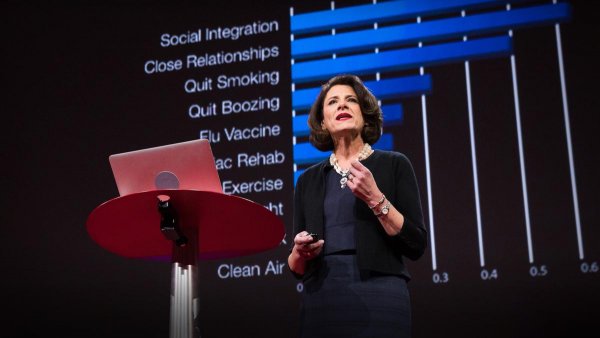The Secret To Living Longer May Be Your Social Life
Tags: opinion

What does it take to live to 100 or beyond?
Susan Pinker is a psychologist, author and social science columnist for The Wall Street Journal. In this TED talk, she suggests that the key to living a long life is to nurture close personal relationships and face-to-face interactions.
“Here’s an intriguing fact. In the developed world, everywhere women live an average six to eight years longer than men do” she says. However, she points out that in Sardinia, an Italian island located in the Western Mediterranean, men live as long as women. After doing some research, she discovered that their longevity was largely due to their lifestyle. “Genes account for just 25 percent of their longevity. The other 75 percent is lifestyle” she says.
What reduces your chances of dying the most? Susan Pinker ranks the predictors of how long you will live from weakest – clean air, exercise and flu vaccine, to the two most powerful predictors. She highlights that there are two features of your social life that will, in some way, determine how long you will live
The first predictor is close relationships: “These are the people that you can call on for a loan if you need money suddenly, who will call the doctor if you are not feeling well or will take you to the hospital.” says Pinker.
The second predictor is social integration: “This means how much you interact with people as you move through your day. How many people do you talk to? And these mean both your weak and your strong bonds, so not just the people you’re really close to, who mean alot to you but, like do you talk to the guy who everyday makes your coffee?”
Pinker also highlights that we spend more time online than any other activity (including sleeping) and warns that this does not serve us in the the same way that face-to-face interactions do. “Face-to-face contact releases a whole cascade of neurotransmitters and like a vaccine, they protect you now in the present and well into the future” She goes on to say that “simply making eye contact with somebody… giving them a high five is enough to release oxytocin, which increases your level of trust and lowers your cortisol levels.
Are we substituting conversation for connection? Pinker provides evidence from a fellow researcher that indicates the difference in brain activity recorded when subjects interact in a face-to-face setting or via static content.
Watch the full video below:
Read more: 105 Year Old Reveals The Secret Behind Living A Long Life

Leave Comment: